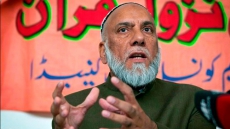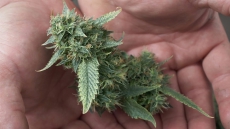VANCOUVER - Premier Christy Clark called a historic meeting between hundreds of British Columbia First Nations' leaders and members of her cabinet a beginning, saying she didn't expect to change history in one day.
Clark placed a positive spin on the proceedings Thursday after aboriginal leaders said the government and First Nations failed to issue a joint communique. One leader said B.C. could soon be wallpapered in lawsuits if the government isn't prepared to recognize aboriginal title provincewide.
"It's no mystery to anybody we really do have a lot of work to do, together," said Clark. "It won't be easy. I do believe we can change history. We do need solutions that work for the whole province, the whole country."
Union of BC Indian Chiefs Grand Chief Stewart Phillip said the government could not agree with a four-point communique First Nations leaders wanted issued at the end of the meeting that established government support for aboriginal rights and title to lands, including revenue sharing.
"We simply aren't there yet," was the government response to the First Nations proposal, Phillip said.
Grand Chief Ed John, First Nations Summit spokesman, said the meeting highlighted the dilemma facing aboriginal rights and title discussions, but "we need to continue this discussion."
Clark said the meeting marks the first time in Canadian history First Nations leaders met with a government and its cabinet. The meeting was the result of a landmark Supreme Court of Canada decision that granted aboriginal title to lands in traditional Tsilhqot'in Nation territory in B.C.'s central Interior.
One Tsilhqot'in leader said June's high court decision gives aboriginals a club to use against government, but Clark said she sees it as a historic opportunity to move relations from the courtroom to the meeting rooms.
Clark told leaders that ignoring the high-court decision granting aboriginal title of a large section of land to the Tsilhqot'in Nation puts the province's future in peril.
The premier told hundreds of First Nations' leaders at a special meeting at a Vancouver hotel that she and members of her cabinet want to use the ruling to work together with aboriginals.
The Supreme Court decision in June granted title to the Tsilhqot'in over 1,750 kilometres of land in the remote Nemiah Valley southwest of Williams Lake in the B.C. Interior. It was the first time in Canadian history a First Nation was granted title to such a vast piece of land.
"That decision set out a fork in the road and as leaders we have a decision to make," said Clark. "We can decide to ignore it, encourage more litigation, put economic development and all of our futures in peril, or we can take it. We can take that fork in the road and begin a journey down a new road."
Legal scholars and political experts have suggested the ruling gives aboriginals massive powers when it comes to land-use issues, especially resource development.
Aboriginal leaders speaking at the opening of the meeting all agreed with Clark that the court decision could spark new relations between First Nations and government, developed through negotiations as opposed to arguments in courtrooms. But they also warned about past injustices and failed reconciliation attempts.
In 2005, former B.C. Liberal premier Gordon Campbell pledged a new relationship with First Nations only to see the initiative crumble amid concerns by the business lobby and mistrust among aboriginals.
Tsilhqot'in Nation Chief Roger William said his people have been celebrating since the court victory. He said the win represents an opportunity to grant powers to aboriginal people.
"We now have a club and that club was made by you all," he said.
John said aboriginals are deeply aware of the pervasive racism in B.C. that has First Nations going to court just to prove their right to exist on the land.
"In the past, what we've been met with is mostly forked tongues," he said. "But I am one of those who is prepared to walk with you."
Assembly of First Nations regional Chief Jody Wilson-Raybould, a federal Liberal Party candidate, said aboriginals will work with the Clark government, but they are seeking recognition of title across B.C., which includes expanded revenue sharing for development on aboriginal territory.
"We can take this recognition road together," she said. "We take very seriously your comments premier. That it is essentially not business as usual. That we can take a different road."
Phillip said the battle for recognition of aboriginal rights and title in B.C. has been "long and ugly."
But he said he viewed the Tsilhqot'in ruling as the tool to lead the way out of the legal and political wilderness.
"Reconciliation is not for wimps," he said. "It's very, very hard work. Our children and our grandchildren deserve a better future."
Clark and the Tsilhqot'in signed agreements Wednesday committing the province and the First Nation to start negotiations to make the court decision work for all British Columbians.
The agreements also map out plans to redress a 150-year-old wound that has yet to heal for the Tsilhqot'in over the hangings of six chiefs during the Chilcotin War of 1864, in which 20 British Columbians died.
Tsilhqot'in National Government spokesman Joe Alphonse said last week that Clark's commitment to redress the hangings of their chiefs inspired the leaders to consider the future.
"I believe this decision can make us all winners," Clark said.





